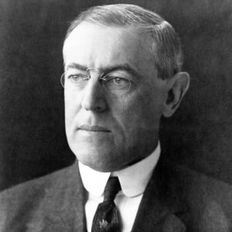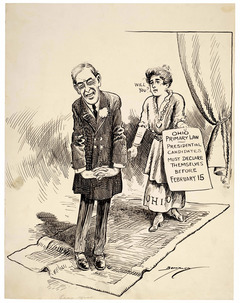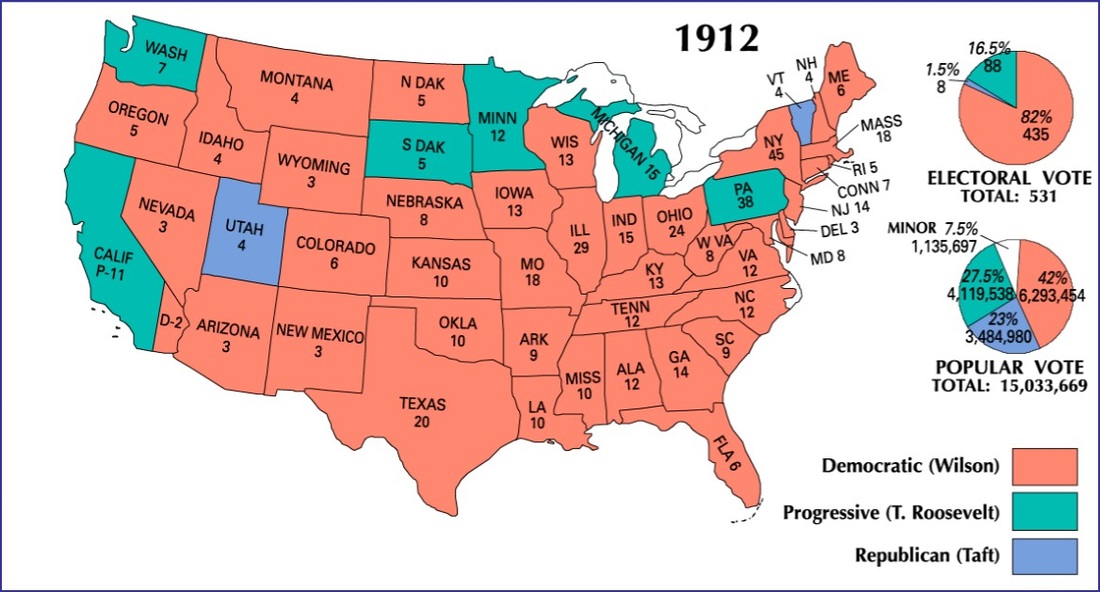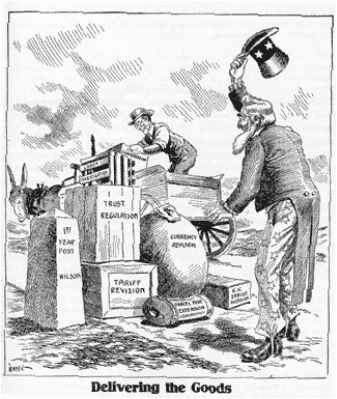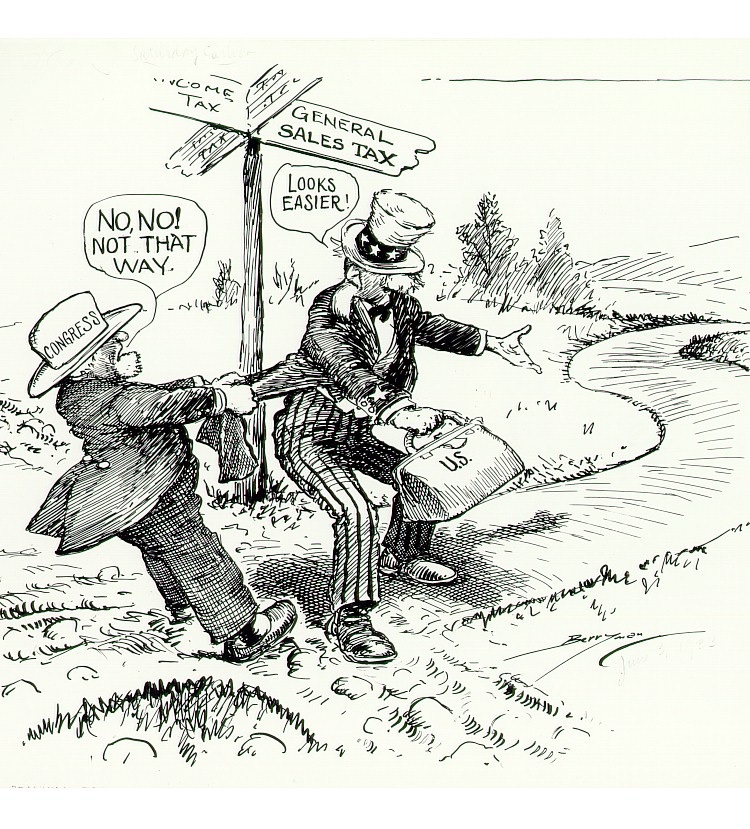Woodrow Wilson
|
BACKGROUND, EXPERIENCES AND PERSONALITY
Thomas Woodrow Wilson—he would later drop his first name—was born on December 28, 1856, in the small Southern town of Staunton, Virginia. His father was a minister of the First Presbyterian Church and later that year his, the family moved to Augusta, Georgia. Young Wilson's earliest memories were of the Civil War, seeing Union soldiers march into town, watching his mother tend wounded Confederate soldiers in a local hospital, and witnessing General Robert E. Lee pass through town under Union guard after his surrender at Appomattox Court House in Virginia. He also saw the poverty and devastation of Augusta during the early years of Reconstruction. In 1870, his family moved to Columbia, South Carolina, and then to Wilmington, North Carolina, in 1874.
Although troubled by weak eyesight and possible dyslexia that delayed his learning to read, Wilson was otherwise a normal boy, playing baseball. Public schools scarcely existed in the South of his youth, and while he received some tutoring from former Confederate soldiers who set up primitive schools after the war, most of his early education came from his father, who emphasized religion and British history and literature. He would continue to purse education throughout his entire life. Eventually passing the bar exam in Georgia and even graduating with a Ph.D from John Hopkins University in history and political science. . Although resigned to a career in education and scholarship, Wilson craved political power and dreamed of becoming a U.S. senator as a stepping stone to the presidency. He would later become president of Princeton University and then become governor of New Jersey. When first approached by representatives of the New Jersey Democratic Party about running for governor of the state in 1910, Wilson agreed, provided that the nomination came with "no strings attached." Party bosses concurred because they needed an honest leader like Wilson to convince voters that recent scandals involving the Democrats would not tarnish the governorship. Within two years, Wilson pushed through legislation that mandated direct party primaries for all elected officials in the state. A corrupt practices act required all candidates to file campaign financial statements, limited campaign expenditures, and outlawed corporate contributions to political campaigns. Additionally, Wilson called for a public utility commission empowered to set rates and supported passage of a workers' compensation law to aid the families of workers killed or injured on the job. |
Wilson as president
|
The Election of 1912
The presidential campaign of 1912 centered on progressive reform. Roosevelt believed that Taft had betrayed progressive ideals. For that reason, he decided to run for president again in 1912. When the Republicans chose Taft as their candidate, Roosevelt decided to run as the candidate of a third party, a political party outside the two-party system. Roosevelt's party was called the Progressive Party but was nicknamed the Bull Moose Party after he declared his readiness by exclaiming, "I feel as fit as a bull moose." The 1912 election also featured two other candidates. Woodrow Wilson, a man of strong progressive ideals, represented the Democratic Party. Labor leader Eugene V. Debs, running on the socialist ticket, advocated more radical change, calling on voters to make "the working class the ruling class." |
The split between Taft and Roosevelt helped Wilson win the 1912 election. Wilson received 42 percent of the popular vote. Roosevelt had 27.5 percent, and Taft had 23 percent. Debs was a distant fourth with 6 percent but received almost a million votes, a strong showing for the Socialist Party.
Reforming Taxes and Tariffs: As the role of the federal government expanded, its need for revenue to fund its programs increased.Big business favored raising tariffs, but progressives wanted to raise taxes. Tariffs on imports had long been used to boost government revenue. However, progressives believed that they were unfair to consumers. By raising the cost of imported goods, tariffs increased the cost of living for average Americans. A national income tax could be imposed more fairly on all citizens.
Reforming Taxes and Tariffs: As the role of the federal government expanded, its need for revenue to fund its programs increased.Big business favored raising tariffs, but progressives wanted to raise taxes. Tariffs on imports had long been used to boost government revenue. However, progressives believed that they were unfair to consumers. By raising the cost of imported goods, tariffs increased the cost of living for average Americans. A national income tax could be imposed more fairly on all citizens.
|
Under strong pressure from progressives, and with some support from Taft, Congress proposed the Sixteenth Amendment, which would allow the federal government to impose an income tax. After the amendment was ratified in 1913, during Wilson's presidency, Congress made the tax a graduated income tax, requiring people with higher incomes to pay a larger percentage of their earnings than those with lower incomes. Progressives were pleased because a graduated income tax placed a higher burden on those who had more money. Meanwhile, Wilson pressured Congress to reduce tariffs. Congress put both measures—the graduated income tax and reduced tariffs—into a single bill, the Underwood Tariff Act. Wilson signed it in 1913.
Electing Senators Directly For progressives, reform also meant giving citizens a greater say in their government. One key issue was the election of U.S. senators. The Constitution required that senators be elected by state legislatures. However, state lawmakers and the senators they elected often had close ties to large corporations. Progressives wanted senators to respond to the will of the people, not the power of big business. Therefore, they pushed Congress to propose the Seventeenth Amendment. Proposed in 1912 and ratified in 1913, the amendment required the direct election of senators by popular vote. This procedure gave average citizens more influence in the Senate. |
ADDRESSING THE EFFECTS OF INDUSTRIALIZATION
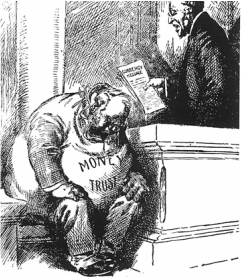
Busting Trusts: Wilson took even stronger action by helping to push the Clayton Antitrust Act through Congress. (Sherman Antitrust Act. This law made illegal "every contract, combination in the form of trust or otherwise, or conspiracy, in restraint of trade or commerce.) Passed in 1914, the Clayton Act extended the power of the Sherman Act by laying out rules that made it harder for trusts to form and to squeeze out competition. For example, the law made it illegal for a company to lower prices in one market but not others to try to force out local competitors.
The Clayton Act also protected labor unions from antitrust regulation. Courts had ruled that unions could be prosecuted for restraining commerce under the Sherman Act, but the Clayton Act made unions exempt from antitrust laws. Congress also created the Federal Trade Commission in 1914 to enforce the Clayton Act's provisions. Progressives who wanted to eliminate trusts were displeased that the antitrust reforms left many trusts intact. Meanwhile, pro-business conservatives thought that the government should not have interfered at all with businesses. Nevertheless, the moderate reforms that were typical of progressivism produced real benefits for society.
Protecting Consumers and Workers: Taft and Wilson expanded worker protection. Under Taft, the Department of Labor established the Children's Bureau to "investigate and report upon all matters pertaining to the welfare of children." Wilson went further to push for a ban on child labor. In 1916, he signed the Keating-Owen Child Labor Act, which prohibited companies involved in interstate commerce from hiring workers under 14 years of age. Although the law protected fewer than 10 percent of children in the labor force, it set minimum protections and a precedent for future action.
Taft and Wilson also supported an eight-hour workday—at least for some workers. For years, companies had resisted this demand by unions. Under Taft, the eight-hour day became the rule for government employees. Wilson later helped secure the same benefit for railroad workers.
The Clayton Act also protected labor unions from antitrust regulation. Courts had ruled that unions could be prosecuted for restraining commerce under the Sherman Act, but the Clayton Act made unions exempt from antitrust laws. Congress also created the Federal Trade Commission in 1914 to enforce the Clayton Act's provisions. Progressives who wanted to eliminate trusts were displeased that the antitrust reforms left many trusts intact. Meanwhile, pro-business conservatives thought that the government should not have interfered at all with businesses. Nevertheless, the moderate reforms that were typical of progressivism produced real benefits for society.
Protecting Consumers and Workers: Taft and Wilson expanded worker protection. Under Taft, the Department of Labor established the Children's Bureau to "investigate and report upon all matters pertaining to the welfare of children." Wilson went further to push for a ban on child labor. In 1916, he signed the Keating-Owen Child Labor Act, which prohibited companies involved in interstate commerce from hiring workers under 14 years of age. Although the law protected fewer than 10 percent of children in the labor force, it set minimum protections and a precedent for future action.
Taft and Wilson also supported an eight-hour workday—at least for some workers. For years, companies had resisted this demand by unions. Under Taft, the eight-hour day became the rule for government employees. Wilson later helped secure the same benefit for railroad workers.
REFORMING NATIONAL GOVERNMENT
Reforming the Banking System
Progressives wanted government to stabilize the banking system.Since the early 1800s, the nation had been shaken by financial panics, periods when people withdrew their money from banks after losing confidence in the economy. Panics caused banks and businesses to collapse and sometimes triggered economic depressions.
Taft urged Congress to reform the banking system, but Americans differed over the proper solution.Progressives wanted government control over the system, while business leaders favored private control. In 1913, Wilson backed a proposal for a government-controlled but decentralized banking system. Congress responded by passing the Federal Reserve Act in 1913.
The Federal Reserve Act divides the country into 12 regions, each with a Federal Reserve Bank.Together, these banks and their operating rules make up the Federal Reserve System, or central bank of the United States. Under this system, private banks remain independent but agree to operate under the rules of the Federal Reserve System, which is also called the Federal Reserve or "the Fed." The Fed offers a safety net to private banks by lending them money if they are short of funds. It also sets monetary policy to regulate the amount of money in circulation, including setting interest rates and regulating how much banks can lend. The Fed has made the financial system much more stable.
Progressives wanted government to stabilize the banking system.Since the early 1800s, the nation had been shaken by financial panics, periods when people withdrew their money from banks after losing confidence in the economy. Panics caused banks and businesses to collapse and sometimes triggered economic depressions.
Taft urged Congress to reform the banking system, but Americans differed over the proper solution.Progressives wanted government control over the system, while business leaders favored private control. In 1913, Wilson backed a proposal for a government-controlled but decentralized banking system. Congress responded by passing the Federal Reserve Act in 1913.
The Federal Reserve Act divides the country into 12 regions, each with a Federal Reserve Bank.Together, these banks and their operating rules make up the Federal Reserve System, or central bank of the United States. Under this system, private banks remain independent but agree to operate under the rules of the Federal Reserve System, which is also called the Federal Reserve or "the Fed." The Fed offers a safety net to private banks by lending them money if they are short of funds. It also sets monetary policy to regulate the amount of money in circulation, including setting interest rates and regulating how much banks can lend. The Fed has made the financial system much more stable.
|
Reforming Taxes and Tariffs As the role of the federal government expanded, its need for revenue to fund its programs increased.Big business favored raising tariffs, but progressives wanted to raise taxes. Tariffs on imports had long been used to boost government revenue. However, progressives believed that they were unfair to consumers. By raising the cost of imported goods, tariffs increased the cost of living for average Americans. A national income tax could be imposed more fairly on all citizens. Under strong pressure from progressives, and with some support from Taft, Congress proposed the Sixteenth Amendment, which would allow the federal government to impose an income tax. After the amendment was ratified in 1913, during Wilson's presidency, Congress made the tax a graduated income tax, requiring people with higher incomes to pay a larger percentage of their earnings than those with lower incomes. Progressives were pleased because a graduated income tax placed a higher burden on those who had more money. Meanwhile, Wilson pressured Congress to reduce tariffs. Congress put both measures—the graduated income tax and reduced tariffs—into a single bill, the Underwood Tariff Act. Wilson signed it in 1913. Women's Suffrage: Like prohibition, the struggle for women's suffrage was a grassroots effort that succeeded without much presidential support. Roosevelt was sympathetic but did not push for the cause until his 1912 campaign. After the nation entered World War I, leading suffragists such as Carrie Chapman Catt emphasized that giving women the right to vote would help them carry out their duties on the |
home front. Wilson eventually accepted their arguments. He urged Congress to propose an amendment to give women the right to vote as "a vitally necessary war measure." Meanwhile, 26 states had petitioned Congress to propose it. In 1919, Congress proposed the amendment by decisive votes in both the House and Senate. The Nineteenth Amendment was ratified in 1920. It declared that "the right of citizens of the United States to vote shall not be denied or abridged by the United States or by any state on account of sex."
WorkCited
|
"History Alive! Pursuing American Ideals." History Alive. N.p., n.d. Web. 30 Mar. 2016.
"History.com - American & World History." HISTORY.com. N.p., n.d. Web. 30 Mar. 2016. "Miller Center." Woodrow Wilson: Life Before the Presidency-. N.p., n.d. Web. 30 Mar. 2016. |
Images:
https://harrisburg.psu.edu/hum/McCormick/vance/political/politcal-cartoons.gif http://41.media.tumblr.com/tumblr_lyzl4edpAT1qhk04bo1_1280.jpg |
